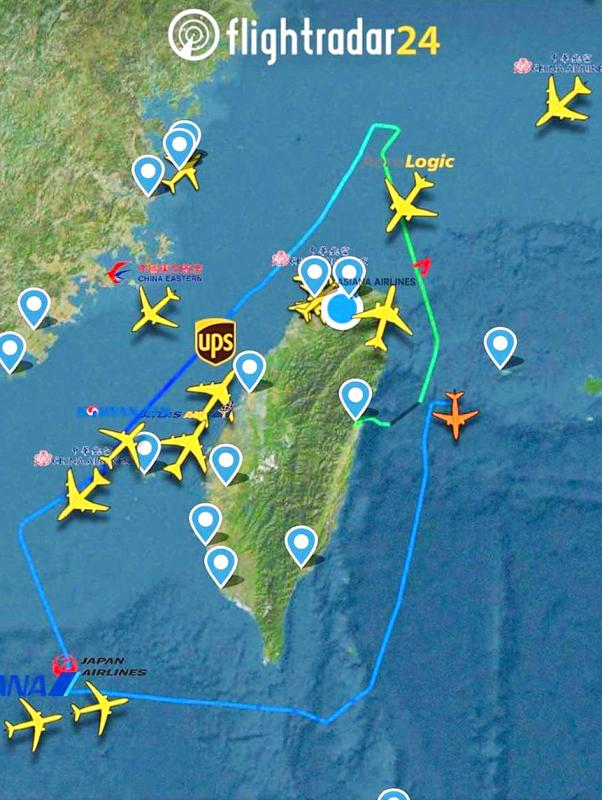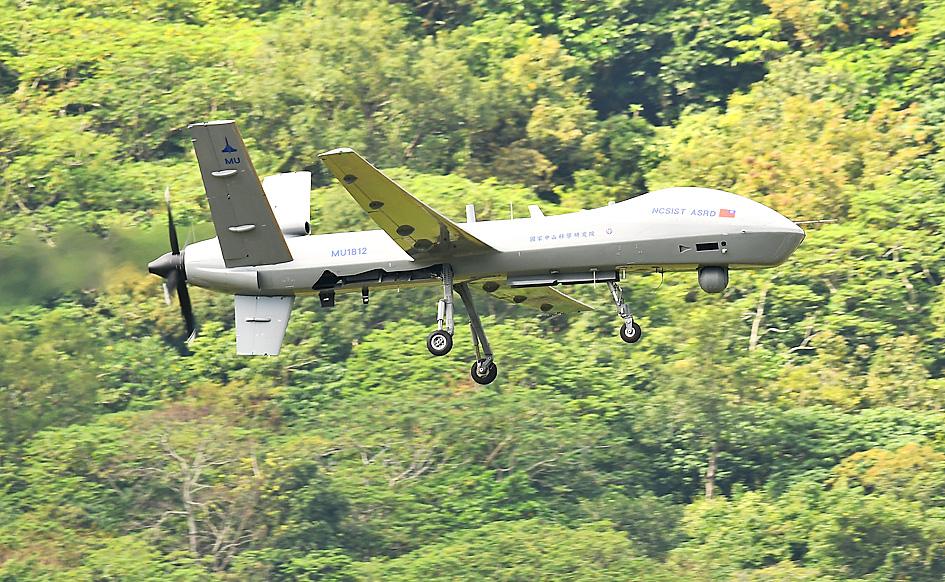The domestically designed Teng Yun 2 drone passed development milestones over the weekend, flying for more than 10 hours straight and circling Taiwan’s air defense identification zone (ADIZ), in the longest flight of an indigenous uncrewed combat aerial vehicle.
Developed by the Chungshan Institute of Science and Technology, the Teng Yun 2, or “Cloud Rider” (騰雲二型), recorded its longest flight yet over the weekend, after a three-hour test flight last month, followed by five and seven-hour stretches in the air.
The Teng Yun 2 No. 1812 departed from Chiashan Air Base in Hualien County at 6:46pm on Saturday and flew on a counter-clockwise route along the edge of the ADIZ, circling Taiwan proper, the institute said.

Screen grab from Flightradar24.com
At 5:02am the following morning, the drone landed safely at the base, after a flight time of 10 hours and 16 minutes, it said.
The Teng Yun 2 was designed to complement the military’s four US-made strategic drones, and has capabilities including day and night aerial image surveillance and reconnaissance, electronic parameter reconnaissance, electronic interference, meteorological observation and signal relay, it said.
The institute would complete testing of the drone by the end of the year, a source said yesterday, adding that it would start mass production if tests go smoothly.

Photo: Yu Tai-lang, Taipei Times
Defence International Magazine editor Chen Kuo-ming (陳國銘) praised the test results, but expressed concerns over lengthy procurement times for the drone’s engine, which is manufactured by the US.
Chen said that the military should seek backup suppliers in the EU to prevent a potential production bottleneck.
The issue might have been discussed at the Monterey Talks, which focused on Taiwan’s asymmetric combat capabilities, he said.
Meanwhile, Taiwan is expected to accept delivery of US-made MQ-9 Reaper drones later this year that the US in 2020 agreed to sell.
Lee Shih-chiang (李世強), head of the Ministry of National Defense’s Department of Strategic Planning, said during a question-and-answer session at the legislature in March last year that the Reaper would fit well with the military’s needs.
The Reaper is a high-altitude drone, whereas the Teng Yun 2 is a low to medium-altitude drone, he said.

CHAOS: Iranians took to the streets playing celebratory music after reports of Khamenei’s death on Saturday, while mourners also gathered in Tehran yesterday Iranian Supreme Leader Ayatollah Ali Khamenei was killed in a major attack on Iran launched by Israel and the US, throwing the future of the Islamic republic into doubt and raising the risk of regional instability. Iranian state television and the state-run IRNA news agency announced the 86-year-old’s death early yesterday. US President Donald Trump said it gave Iranians their “greatest chance” to “take back” their country. The announcements came after a joint US and Israeli aerial bombardment that targeted Iranian military and governmental sites. Trump said the “heavy and pinpoint bombing” would continue through the week or as long

TRUST: The KMT said it respected the US’ timing and considerations, and hoped it would continue to honor its commitments to helping Taiwan bolster its defenses and deterrence US President Donald Trump is delaying a multibillion-dollar arms sale to Taiwan to ensure his visit to Beijing is successful, a New York Times report said. The weapons sales package has stalled in the US Department of State, the report said, citing US officials it did not identify. The White House has told agencies not to push forward ahead of Trump’s meeting with Chinese President Xi Jinping (習近平), it said. The two last month held a phone call to discuss trade and geopolitical flashpoints ahead of the summit. Xi raised the Taiwan issue and urged the US to handle arms sales to

BIG SPENDERS: Foreign investors bought the most Taiwan equities since 2005, signaling confidence that an AI boom would continue to benefit chipmakers Taiwan Semiconductor Manufacturing Co’s (TSMC, 台積電) market capitalization swelled to US$2 trillion for the first time following a 4.25 percent rally in its American depositary receipts (ADR) overnight, putting the world’s biggest contract chipmaker sixth on the list of the world’s biggest companies by market capitalization, just behind Amazon.com Inc. The site CompaniesMarketcap.com ranked TSMC ahead of Saudi Aramco and Meta Platforms Inc. The Taiwanese company’s ADRs on Tuesday surged to US$385.75 on the New York Stock Exchange, as strong demand for artificial intelligence (AI) applications led to chip supply constraints and boost revenue growth to record-breaking levels. Each TSMC ADR represents

Pro-democracy media tycoon Jimmy Lai’s (黎智英) fraud conviction and prison sentence were yesterday overturned by a Hong Kong court, in a surprise legal decision that comes soon after Lai was jailed for 20 years on a separate national security charge. Judges Jeremy Poon (潘兆初), Anthea Pang (彭寶琴) and Derek Pang (彭偉昌) said in the judgement that they allowed the appeal from Lai, and another defendant in the case, to proceed, as a lower court judge had “erred.” “The Court of Appeal gave them leave to appeal against their conviction, allowed their appeals, quashed the convictions and set aside the sentences,” the judges